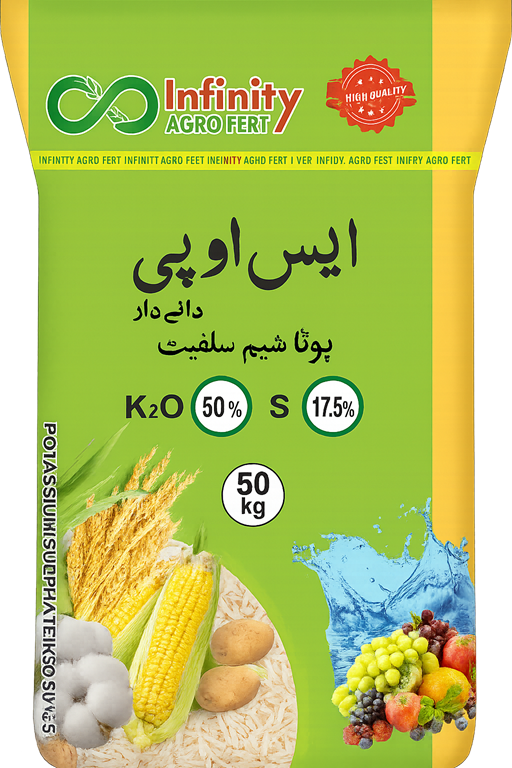
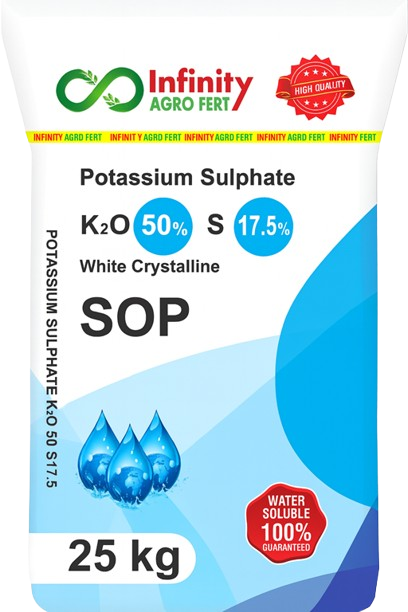
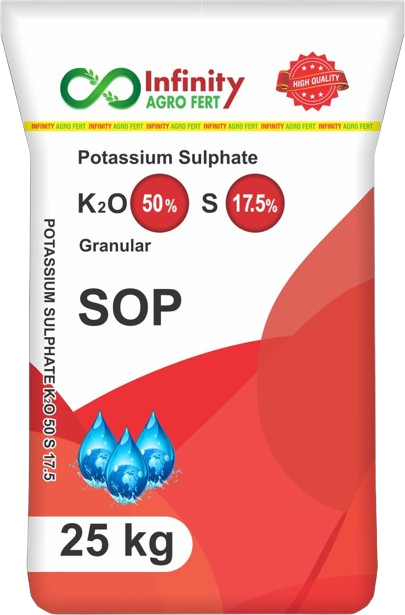
Potassium Sulphate
(White Granules)
(K2O 50 – S 17.5%)
(White Crystalline)
(K2O 50 – S 17.5%)
Benefits of Potassium Sulphate (SOP)
Double Duty Nutrient Delivery: It provides essential nutrients for plant growth: potassium (K) and sulphur (S). Potassium is crucial for many plant functions like regulating water balance, activating enzymes, and starch production. Sulphur is also needed for protein synthesis and enzyme function. In Pakistan, where sulphur deficiency can be an issue in some soils, potassium sulphate can be particularly beneficial.
Improved Stress Tolerance: Potassium sulphate can help crops better withstand environmental stresses like drought, heat, and cold. This is because potassium helps plants regulate their water use and maintain cell integrity.
Enhanced Crop Quality: Studies have shown that potassium sulphate can improve the quality of fruits and vegetables. This can include better flavour, colour, and shelf life. This can be important for Pakistani farmers who want to get the highest price for their produce.
Reduced Risk of Salt Damage: Unlike some other potassium fertilisers, potassium sulphate does not contain high levels of chloride (Cl). High chloride levels in saline soils can damage some crops. So, potassium sulphate can be a better choice for these situations.
Improved drought tolerance: Studies suggest potassium can help plants use water more efficiently, potentially improving their tolerance to drought conditions.
Suitable for Various Application Methods: Potassium sulphate is water-soluble, making it suitable for fertigation (applying fertiliser through irrigation systems) and foliar application (spraying fertiliser directly on leaves).
| S. no | Parameters | Standard | Result |
|---|---|---|---|
| 1 | Sulphate | 93.0 % Min | 94.0 % |
| 2 | K2O | 50.0 % Min | 50.8 % |
| 3 | Sulfur | 18.0 % Min | 18.0 % |
| 4 | Chlorides | 2.0 % Max | 0.60 % |
| 5 | Moisture | 1.0 % Max | 0.07 % |
| 6 | Insoluble substances in water | 1.0 % Max | 0.31 % |
| 7 | Appearance | Crystalline granular of cream color, grayish or reddish tint is allowed. | Crystalline white granular. |
MAP Water Soluble White Crystalline
Water Soluble White Crystal
MAP (12-61-0)
| S. no | Parameters | Standard | Result % |
|---|---|---|---|
| 1 | Total Nutrient (N+P+K) | 73.0 % Min | 73.1 |
| 2 | Nitrogen (as N) | 11.0 % Min | 12.0 |
| 3 | P as P2O5 | 60.0 % Min | 61.3 |
| 4 | Moisture | 0.5 % Max | 0.3 |
| 5 | Insoluble | 0.3 % Max | 0.2 |
| 6 | As | 0.005% | 0.001 |
| 7 | Cd | 0.001% Max | 0.0003 |
| 8 | Pb | 0.2% Max | 0.004 |
| 9 | Cr | 0.05% | 0.0025 |
| 10 | Hg | 0.0005% Max | 0.00005 |
| 11 | Tl | 0.00025% Max | 0.00005 |
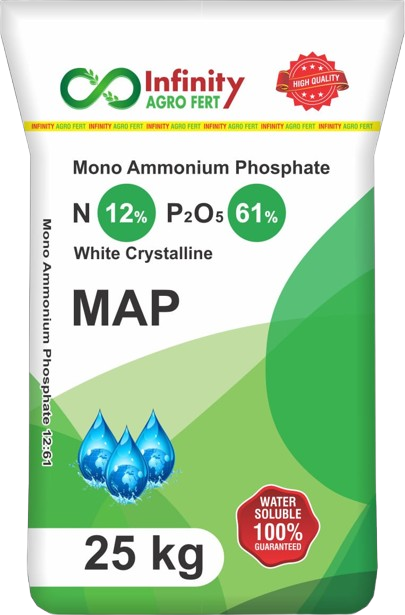
Benefits of Monoammonium Phosphate (MAP)
Increased Crop Yield: MAP is a readily available source of both nitrogen (N) and phosphorus (P), two of the most essential nutrients for plant growth. Nitrogen promotes leaf growth and photosynthesis, while phosphorus is crucial for root development, seed formation, and overall plant health. By providing these essential nutrients, MAP can help crops reach their full potential yield.
Improved Root Development: MAP is particularly beneficial for promoting strong root development in crops. This is due to the presence of ammonium (NH4+), a form of nitrogen that is readily taken up by plants. Strong roots allow plants to access water and nutrients more efficiently, leading to better growth and higher yields.
Enhanced Seed Production: Phosphorus (P) from MAP plays a vital role in seed formation and development. By ensuring adequate phosphorus availability, MAP can help crops produce more and higher quality seeds.
Better Soil Acidity: MAP has a mild acidifying effect on soil. In some cases, this can be beneficial, particularly in Pakistani soils that tend to be alkaline. A slightly acidic soil can improve the availability of certain nutrients, such as iron and zinc, which can be beneficial for plant growth.
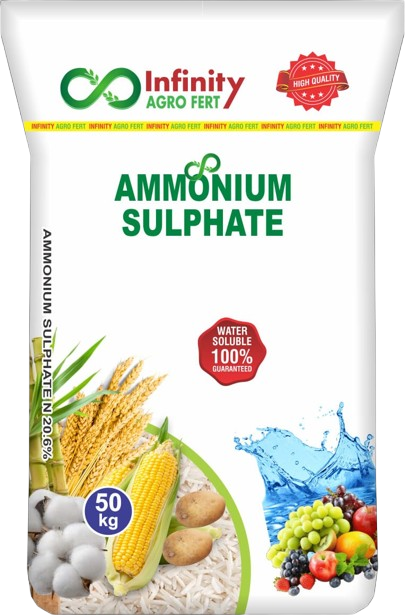
Ammonium Sulphate
Water Soluble White Crystal
AS (20.6% N)
| S. no | Parameters | Standard | Result % |
|---|---|---|---|
| 1 | Nitrogen (as N) | 20.6 % Min | 20.6 |
| 2 | Sulphur (as S) | 23.0 % Min | 23.5 |
| 3 | Moisture | 1.0 % Max | 0.2 |
| 4 | Water Solubility | 100 % | 100 |
| 5 | Appearance | White crystalline granular/powder | White crystalline granular |
Benefits of Ammonium Sulphate (AS)
Boosts Nitrogen Supply:
Ammonium Sulphate is a concentrated source of nitrogen (20.6%), which promotes healthy leaf growth, greener plants, and improved photosynthesis. This leads to stronger and more vigorous crops.
Enhances Sulphur Nutrition:
It provides about 23% sulphur in the sulphate form, which is readily available for plants. Sulphur is essential for protein formation, oil production, and improving the quality of crops.
Improves Crop Yield:
The balanced supply of nitrogen and sulphur supports both vegetative and reproductive growth, resulting in higher yields and better-quality produce.
Better Soil Management:
Ammonium Sulphate has a mild acidifying effect on soil, making it especially beneficial in alkaline soils. This increases the availability of micronutrients like zinc, iron, and manganese.
Highly Water Soluble:
Being 100% water soluble, Ammonium Sulphate is ideal for fertigation and foliar applications, ensuring fast absorption and efficient nutrient use by crops.

